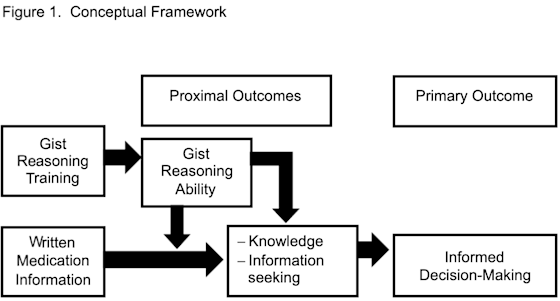Overview
Individuals with rheumatoid arthritis often lack access to accurate, personally relevant information about treatment options. Limited understanding of the gist (i.e., “bottom-line” meaning) of consumer medication information has become an obstacle in treatment. This study collected data through DrugFactsBox, telephone interviews and online questionnaires at 4 time points (baseline, 6-week, 3-month, 6-month time) from 286 participants, randomly assigning each to one of four groups: DrugFactsBox; DrugFactsBox with SMART™ Brain Training; other consumer medication information (CMI); or other CMI with SMART. adequate knowledge.Findings from this study suggest participants provided with SMART strategies over six months demonstrated improvements in informed decision making. Among those with knowledge deficits, SMART may facilitate informed decision making by helping develop skills needed to understand and use complex information concerning medication risks/benefits.
Figure 1 demonstrates the conceptual framework behind this study which concludes that providing gist reasoning training can make individuals better consumers of information. Which, in the context of medication information, leads to more informed decision making regarding treatments.



